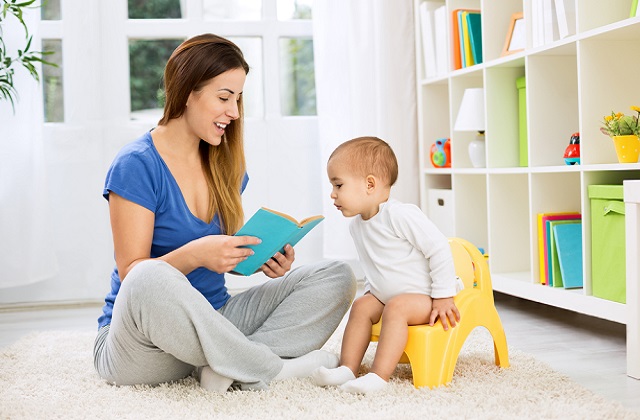RELAX Lah, with your Baby!
Here’s how you can make the most out of the time you spend with your little one
By: Kel Tan
If you and your spouse both hold full-time jobs, the limited time that you get to spend with your baby can be precious. Being away from your little one for hours on end each day can lead to separation anxiety; how can you ensure that you can still be there for him or her every step of the way?
Spending time with your child is integral to his or her development, especially in the early formative years. Ultimately, however, its quality and not quantity that counts.
Researchers from the University of Texas at Austin conducted a study on working women who spent limited time with their infants, as well as homemakers who spent more time with their children.
The conclusion? There were no differences in the children’s development up to three years of age.
Be it long or short, the time you spend with your baby should help you to establish a more empathetic and trusting parent-child relationship.
Learn how to create quality time with these five tips.
Build bonding time into your schedule
With proper planning, it’s possible to carve out extra pockets of time for your child. For instance, set your alarm half an hour earlier every morning so that you or your spouse can nurse your baby before going to work.
Do also make it a priority to bond with your little one once you get home from the office. Instead of immediately rushing to complete household chores, spend some quiet time cuddling with him or her.

You can also involve your baby in everyday tasks.
Be creative; for example, if you’re cleaning out your closet, you can play simple games with him or her, such as peek-a-boo with a piece of clothing.
Out for a run? You can take your baby along in a jogging stroller. Now, how’s that for some extra training?
Stay organised
Don’t spend more time on chores than you do on your little one.
Advance planning is key – get things like breast pumps and the diaper bag packed and ready to go the night before, so there isn’t a mad scramble in the morning.
“It’s difficult for parents to bond with their baby if they’re affected by other problems, such as keeping the house in order. This results in them not having the physical and mental energy to attend to their newborn,” says Miss Ong Li Lian, Case Manager for Mental Wellness Service at KK Women’s and Children’s Hospital.

If you’ve gotten your parents or in-laws to babysit on weekends so that you can tackle household chores, consider trading duties with them. Get them to help out with simple errands like grocery shopping while you spend time together with your baby instead.
Prioritise your activities
While you shouldn’t have to give up your fun and games after having a child, it’s perfectly legitimate to say no to certain social engagements, such as post-work drinks, in order to spend more time with your baby.
“Keep your schedule as simple as possible during the first few months of parenthood. Don’t fill up every moment during this important period of immense change in your life,” advises Mr Lau Tat Chuan, Director of Centre for Fathering.
.jpg)
You may also want to dedicate the majority of your weekends to your little one – this is when you can really enjoy quality time with your baby without the stress and prsure of upcoming work.
Consider alternative work arrangements
Some companies in Singapore offer flexible work arrangements (FWAs), such as flexi-time and flexi-place.

In these situations, employees are allowed to choose their starting and finishing times daily (provided they work a fixed number of hours), or to carry out their work at a location away from the office.
These arrangements may enable you to spend more time at home with your baby; enquire with your HR department about your organisation’s policies.
Of course, don’t forget to take full advantage of parental leave schemes.
Eligible working mothers are entitled to 16 weeks of paid maternity leave, while eligible working fathers are entitled to two weeks of paid paternity leave.
Furthermore, as a working parent with a child below 7-years old, you’re entitled to six days of paid childcare leave per year, along with six days of unpaid infant care leave.
Do note that these benefits apply to working parents of children who are Singapore citizens; click here for more information.
Don’t guilt-trip yourself
There’s really no need to be a helicopter mum or dad.
While parent-child bonding is integral, it’s also equally important for babies to spend some time alone (under watchful eyes). This ensures that your little one is neither overly needy nor stimulated; this also gives him or her the freedom to play alone and make new discoveries by themselves.

Treasure the little moments, too – from hearing your baby laugh uncontrollably at a random event, to those precious minutes of snuggle time before bed.
“Don’t underestimate the power of touch; cuddle, hug and hold your child,” says Miss Shelwyn Tay, Clinical Psychologist and founder of The Integrated Psychology Practice.
You don’t always need to take your baby to new and exciting places in order to build lasting memories. Once again, it’s the quality of time spent, not the quantity, that really matters.
References: https://ilovechildren.sg/be-informed/article/relax-lah-your-baby?tid=3
Source: https://ilovechildren.sg/be-informed/article/relax-lah-your-baby?tid=3
